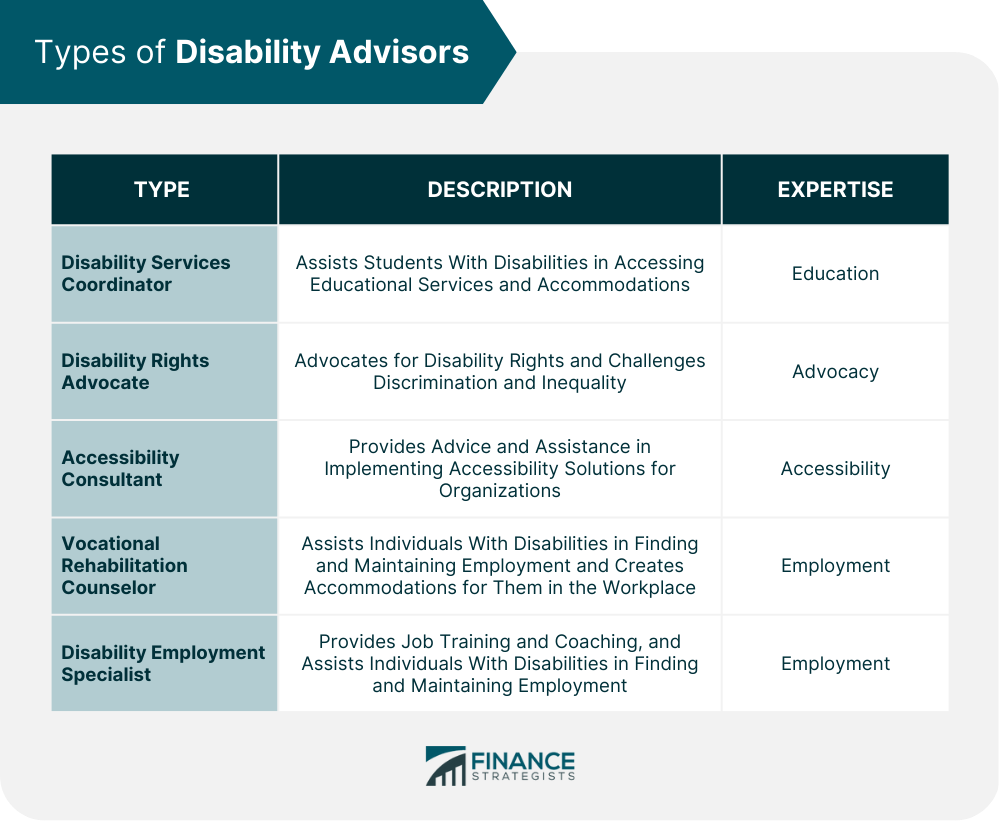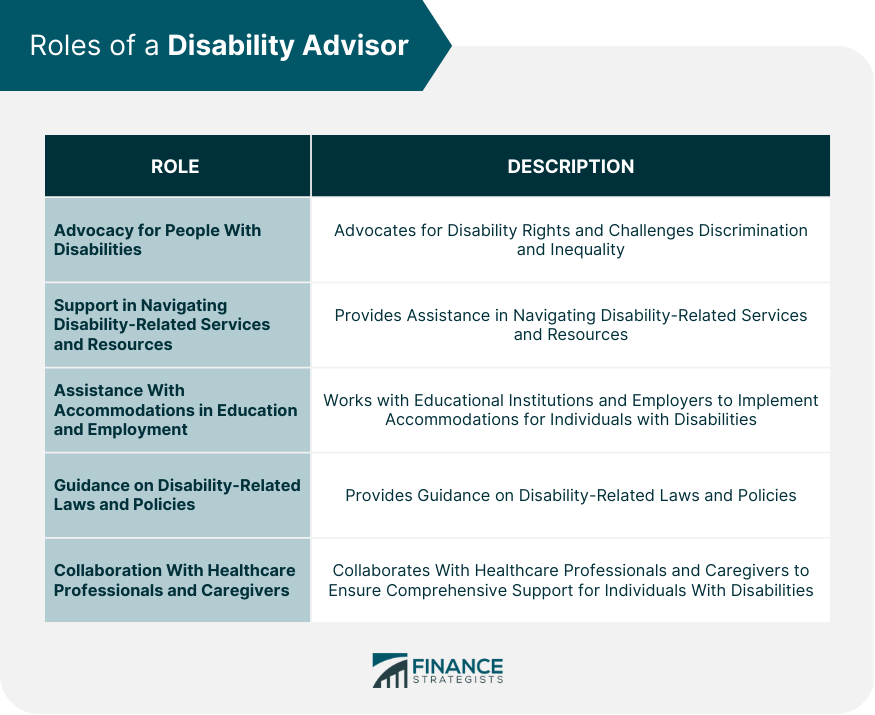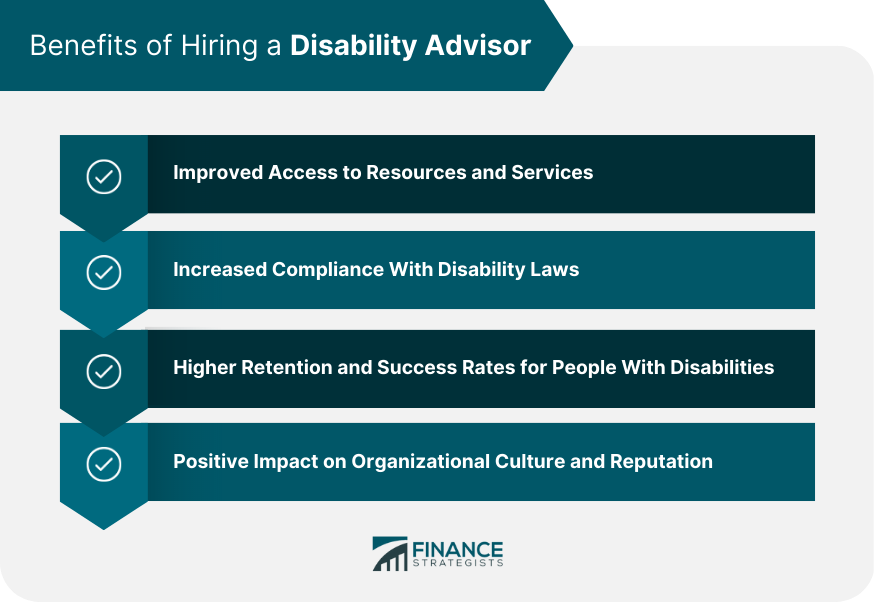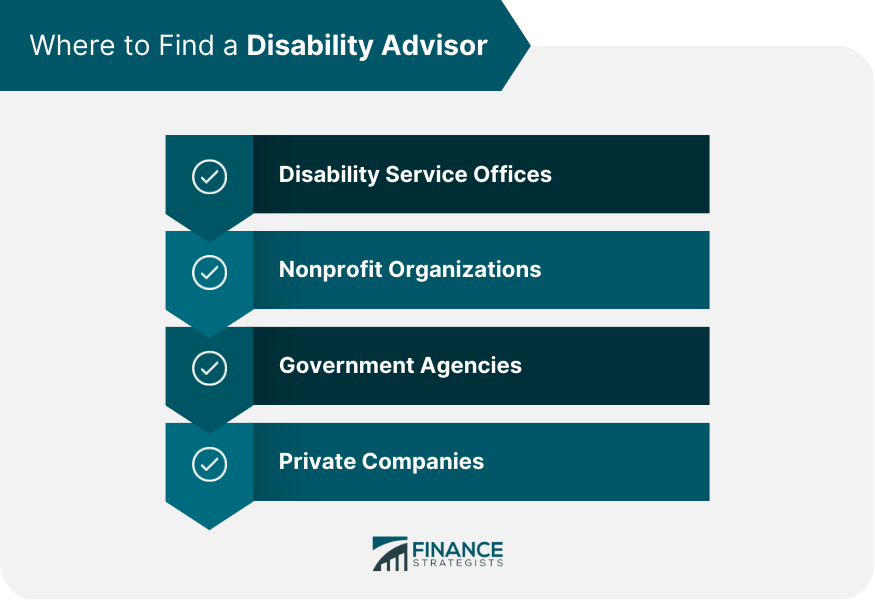A disability advisor is a professional who provides guidance and support to individuals with disabilities, their families, caregivers, and advocates. Disability advisors can work in various fields, including education, employment, and accessibility consulting. They assist individuals with disabilities in accessing resources and services, navigating disability-related systems, and advocating for accommodations and services. Disability advisors should have the necessary qualifications, skills, and knowledge to effectively advocate for individuals with disabilities and provide guidance on disability-related issues. There are several types of disability advisors, each with a specific focus and area of expertise. A disability services coordinator (DSC) is a professional who assists people with disabilities in accessing and utilizing services and accommodations in educational settings. DSCs work in colleges, universities, and K-12 schools. They provide support to students with disabilities, ensuring that they have equal access to educational opportunities. They work with faculty and staff to develop and implement accommodations and assistive technologies for students with disabilities. Disability rights advocates are professionals who work to ensure that people with disabilities have equal access to opportunities and services. They advocate for disability rights and challenge discrimination and inequality. Disability rights advocates work with individuals, families, and organizations to promote the inclusion and rights of people with disabilities. Accessibility consultants are professionals who help organizations ensure that their products, services, and facilities are accessible to people with disabilities. They provide advice on accessibility standards and best practices and assist organizations in implementing accessibility solutions. Accessibility consultants work with a wide range of clients, including businesses, government agencies, and non-profit organizations. A vocational rehabilitation counselor (VRC) is a professional who assists individuals with disabilities in finding and maintaining employment. They help individuals with disabilities identify their vocational goals, develop job skills, and find suitable employment. VRCs work with employers to create accommodations for individuals with disabilities and ensure that they have access to equal employment opportunities. Disability employment specialists are professionals who work with individuals with disabilities to find and maintain employment. They provide job training, job coaching, and other support to individuals with disabilities. Disability employment specialists also work with employers to create accommodations for individuals with disabilities and ensure that they have access to equal employment opportunities. To effectively provide guidance and support to individuals with disabilities, disability advisors should have the necessary qualifications, skills, and knowledge in the field of disabilities. Most disability advisors have a bachelor's or master's degree in a field related to disabilities, such as rehabilitation counseling, social work, or special education. Some may have additional training or certification in disability-related fields, such as assistive technology or accessibility. There are several certifications and licenses that disability advisors may hold, depending on their area of expertise. For example, vocational rehabilitation counselors may hold a Certified Rehabilitation Counselor (CRC) certification, while accessibility consultants may hold a Certified Professional in Accessibility Core Competencies (CPACC) certification. Disability advisors must have excellent communication skills to effectively work with individuals with disabilities, their families, and other professionals. They should have knowledge of disability laws, policies, and best practices. They should also have the ability to develop and implement accommodations and assistive technologies for individuals with disabilities. Disability advisors play a critical role in advocating for individuals with disabilities, navigating disability-related systems, and providing guidance on disability-related issues. One of the primary roles of a disability advisor is to advocate for people with disabilities. They work to ensure that individuals with disabilities have equal access to opportunities and services and challenge discrimination and inequality. Disability advisors provide support to individuals with disabilities in navigating disability-related services and resources. They can assist with applying for disability benefits, accessing healthcare services, and finding housing or transportation. Disability advisors work with educational institutions and employers to develop and implement accommodations for individuals with disabilities. They can provide guidance on the types of accommodations available and assist with the process of requesting and implementing them. This can include assistive technologies, physical environment modifications, and work or school schedule adjustments. Disability advisors should have knowledge of disability-related laws and policies, such as the Americans with Disabilities Act (ADA), the Individuals with Disabilities Education Act (IDEA), and the Rehabilitation Act of 1973. They can provide guidance to individuals and organizations on compliance with these laws and policies and advocate for changes to improve disability rights and accessibility. Disability advisors may collaborate with healthcare professionals and caregivers to ensure that individuals with disabilities receive comprehensive support. They can provide guidance on medical care, rehabilitation, and mental health services, work with caregivers to develop care plans and provide training on assistive technologies and other supports. Hiring a disability advisor can significantly benefit individuals with disabilities, their families, caregivers, advocates, organizations, and businesses. Hiring a disability advisor can help individuals with disabilities access the resources and services they need to succeed. Disability advisors can assist with navigating disability-related systems and advocating for accommodations and services. Disability advisors can ensure organizations comply with disability-related laws and policies, such as the ADA and IDEA. They can guide compliance and advocate for changes to improve accessibility and inclusion. Providing support and accommodations to individuals with disabilities can improve their retention and success rates in education and employment. Hiring a disability advisor can help organizations create a more inclusive and supportive environment for people with disabilities. Hiring a disability advisor can demonstrate an organization's commitment to diversity, inclusion, and accessibility. It can improve organizational culture and reputation and attract and retain employees and customers who value these principles. If you or someone you know needs the support of a disability advisor, it is essential to know where to find qualified professionals who can provide guidance and assistance in navigating disability-related systems and issues. Most colleges, universities, and K-12 schools have disability service offices staffed by disability advisors. These offices provide support and accommodations to students with disabilities, ensuring they have equal access to educational opportunities. Many nonprofit organizations provide support and resources to individuals with disabilities and their families. These organizations may have disability advisors on staff who can provide guidance and support on disability-related issues. Several government agencies provide resources and support to individuals with disabilities, such as the Department of Education's Office for Civil Rights and the Social Security Administration's Office of Disability Adjudication and Review. These agencies may have disability advisors on staff who can provide guidance and support. Some private companies provide disability-related services like accessibility consulting or vocational rehabilitation. These companies may have disability advisors on staff who can provide guidance and support on disability-related issues. Disability advisors play a crucial role in providing guidance and support to individuals with disabilities, their families, caregivers, and advocates. There are several types of disability advisors, including disability services coordinators, disability rights advocates, accessibility consultants, vocational rehabilitation counselors, and disability employment specialists. Disability advisors should have the necessary qualifications, skills, and knowledge to effectively advocate for individuals with disabilities and provide guidance on disability-related issues. Hiring a disability advisor or a financial advisor can improve access to resources and services, increase compliance with disability laws, improve retention and success rates for people with disabilities, and positively impact organizational culture and reputation.What Is a Disability Advisor?
Types of Disability Advisors
Disability Services Coordinator
Disability Rights Advocate
Accessibility Consultant
Vocational Rehabilitation Counselor
Disability Employment Specialist

Qualifications of a Disability Advisor
Education and Training
Certifications and Licenses
Skills and Abilities
Roles of a Disability Advisor
Advocacy for People With Disabilities
Support in Navigating Disability-Related Services and Resources
Assistance With Accommodations in Education and Employment
Guidance on Disability-Related Laws and Policies
Collaboration With Healthcare Professionals and Caregivers

Benefits of Hiring a Disability Advisor
Improved Access to Resources and Services
Increased Compliance With Disability Laws
Higher Retention and Success Rates for People With Disabilities
Positive Impact on Organizational Culture and Reputation

Where to Find a Disability Advisor
Disability Service Offices
Nonprofit Organizations
Government Agencies
Private Companies

Takeaway
Disability Advisor FAQs
A disability advisor is a professional who provides guidance and support to individuals with disabilities, their families, caregivers, and advocates. They help individuals with disabilities access resources and services, navigate disability-related systems, and advocate for accommodations and services.
There are several types of disability advisors, including disability services coordinators, disability rights advocates, accessibility consultants, vocational rehabilitation counselors, and disability employment specialists.
Most disability advisors have a bachelor's or master's degree in a field related to disabilities, such as rehabilitation counseling, social work, or special education. They may also have additional training or certification in disability-related fields, such as assistive technology or accessibility.
The role of a disability advisor is to advocate for individuals with disabilities, navigate disability-related systems, and provide guidance on disability-related issues. They assist individuals with disabilities in accessing resources and services, finding employment, and advocating for accommodations and services.
Hiring a disability advisor can improve access to resources and services, increase compliance with disability laws, improve retention and success rates for people with disabilities, and positively impact organizational culture and reputation. It demonstrates an organization's commitment to diversity, inclusion, and accessibility.
True Tamplin is a published author, public speaker, CEO of UpDigital, and founder of Finance Strategists.
True is a Certified Educator in Personal Finance (CEPF®), author of The Handy Financial Ratios Guide, a member of the Society for Advancing Business Editing and Writing, contributes to his financial education site, Finance Strategists, and has spoken to various financial communities such as the CFA Institute, as well as university students like his Alma mater, Biola University, where he received a bachelor of science in business and data analytics.
To learn more about True, visit his personal website or view his author profiles on Amazon, Nasdaq and Forbes.











